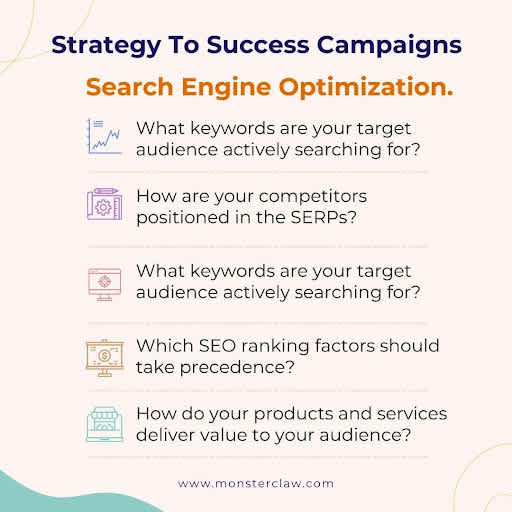SEO Campaign Management- A Strategy To Success
ByJulian Gette
Workast publisher

Workast publisher
Managing your SEO campaign involves the strategic planning, meticulous tracking, and continuous optimization of your SEO strategy to enhance your search engine rankings. You need to employ an effective method for successfully managing your SEO campaign. This includes following a few recommended best practices to secure a prominent position in the search engine results pages (SERPs).
SEO campaign management is the practice of planning, tracking, and optimizing the performance of your SEO strategy. This helps you boost your search engine rankings. By managing your SEO campaign, you can improve your strategy to drive more revenue for your business.
Now that you understand the concept of SEO campaign management, you might be curious about its specifics. To succeed in reaching the pinnacle of SERPs, it's imperative to skillfully manage your SEO campaign. So, continue reading to gain valuable insights!
Research is the crucial first step in crafting an effective SEO strategy. Before planning, it's essential to touch upon several key areas.
Firstly, gaining a deep understanding of your target audience is important. This knowledge will guide you in tailoring your content and optimization efforts to resonate with your intended viewers.
Secondly, identifying pertinent SEO keywords is fundamental. These keywords act as the bridge between your content and search engine users. Moreover, analyzing your competitors can provide invaluable insights. Understanding where your rivals currently rank in the Search Engine Results Pages (SERPs) allows you to formulate a strategy that aims to surpass them.
Lastly, assessing the various SEO ranking factors is crucial. It helps you pinpoint which aspects of optimization to focus on for maximum impact. As you plan your campaign, keep these questions in mind:
What keywords are your target audience actively searching for?
How are your competitors positioned in the SERPs?
Which SEO ranking factors should take precedence?
How do your products and services deliver value to your audience?
What innovative approaches can set your website apart in the competitive realm of search results?
In summary, thorough research into your audience, competitors, and SEO factors forms the cornerstone of a successful strategy.
One of the most critical steps in effectively managing your SEO strategy is optimizing your website. Successful optimizations are the key to unlocking higher search engine rankings and increased web traffic for your company.
Numerous aspects of your website can be enhanced to bolster your rankings. These improvements include optimizing your title tags and header tags, strategically incorporating keywords throughout your site, crafting custom content, enhancing user experience, and more.
It's essential to understand that website optimization is a process that requires time and patience. Results from these optimizations may not show immediately. However, it's crucial not to be discouraged.
Typically, most companies start to witness tangible results approximately four to six months after implementing their optimization strategies. This gradual progress is a testament to the long-term benefits of diligent website optimization efforts.
For an effective SEO campaign management strategy, another crucial step is the process of reporting and analysis. Evaluating the outcomes of your efforts is fundamental for discerning which techniques and optimizations yielded the most favorable results for your company.
For the success of your campaign, it's imperative to create regular reports, whether on a monthly or quarterly basis. These reports serve as valuable tools for monitoring your organic traffic, leads, and conversions.
Subsequently, the analysis of these results allows you to pinpoint the tactics that had the most significant impact on your rankings and traffic. Armed with this insight, you can channel your efforts toward these strategies in future endeavors. This cyclic process of reporting and analysis is pivotal for the ongoing refinement and effectiveness of your SEO strategy.
One fundamental aspect of managing your SEO campaign is meticulous planning. To chart your strategy effectively, it's essential to define clear goals. While enhancing search engine rankings is the primary aim of SEO, you can set various specific objectives for your strategy.
Some common SEO goals encompass targeting informative keywords to address user inquiries, enhancing the overall user experience on your website, and focusing on transactional keywords to attract users prepared for purchase.
Before optimization, it's highly advisable to conduct a thorough SEO audit of your website. Such an audit assesses numerous factors that influence your site's ability to rank in search results. During your website's SEO performance audit, pay attention to aspects like the usage of keywords, internal linking structure, sitemap efficiency, backlink quality, page loading speed, mobile responsiveness, and site security measures.
Keywords are the terms and phrases that your target audience uses when searching online. It's crucial to incorporate these essential keywords throughout your website to ensure that your target audience can easily discover your business while searching for your products or services. To uncover the specific phrases your audience uses, conducting keyword research is essential.
When conducting keyword research, consider what words and phrases your audience might use during online searches. When conducting keyword research, consider what words and phrases your audience might use during online searches. To make the process easier on yourself, you can opt for a Google Trends API that will provide you with location-specific keyword trends - and that's only a part of the unlimited access you get to the ultimate source of high-quality search interest data called Google Trends. Generally speaking, you'll want to brainstorm and identify two main categories of keywords:
Informational Keywords: These are the phrases that your audience uses when seeking answers to their questions or solutions to their problems. For instance, if you sell car cleaning products, your audience may search for phrases like "how to clean your windshield" or "how to wax your car."
Transactional Keywords: These are the phrases that your audience uses when they are ready to make a purchase. For example, if you sell women's clothing, your audience might search for phrases like "buy summer dresses" or "places that sell denim shorts."
Enhancing your website's on-page elements is a critical aspect of improving your rankings in search engine results. On-page SEO encompasses a range of optimizations that are directly implemented on your website. These optimizations are essential because they not only help search engines understand your content better but also provide a superior experience for your visitors.
Improving on-page elements is vital for better search engine rankings. On-page SEO refers to optimizations made directly on your website. Key elements include:
Title Tags: Craft descriptive titles with relevant keywords.
Header Tags: Structure content using H1, H2, H3 tags for clarity.
Meta Descriptions: Write concise, keyword-rich summaries.
Internal Links: Connect relevant pages for better navigation.
Page Load Speed: Optimize load times for user experience.
Content Quality: Provide high-quality, keyword-rich content.
Images: Optimize images for faster loading and add alt text.
Mobile-Friendliness: Ensure your site is responsive for mobile users.
While on-page SEO focuses on your website's content and structure, don't overlook the importance of off-page SEO. These strategies occur outside your site but significantly impact your search engine rankings. Key elements include:
Backlinks: Links from reputable sites to yours boost your website's credibility and rankings.
Social Media Sharing: Content sharing on social platforms widens your reach and can lead to more traffic and backlinks.
Domain Authority: It reflects your site's trustworthiness, often influenced by backlinks. Higher authority correlates with better rankings.
Off-page SEO encompasses various strategies beyond these, such as influencer marketing and online reputation management. These efforts expand your digital presence and complement on-page optimization, leading to improved rankings and increased organic traffic.
The next essential step in managing your SEO campaign is to create high-quality content. The phrase "content is king" holds true in the SEO world, as the quality of your content significantly influences your search engine rankings.
When developing content for your SEO campaign, it's necessary to include the strategic placement of keywords in titles, headers, and body text. Your content should also aim to answer your audience's questions, ensuring it meets their needs effectively.
Enhance readability by making content easy to skim, utilizing visuals like images or videos to break up large blocks of text, and including internal links for seamless navigation.
By providing valuable content that addresses readers' questions and needs, you help keep users engaged on your site. Additionally, you also send positive signals to search engines like Google, indicating that your content is genuinely helpful for readers. This, in turn, contributes to improved search engine rankings and overall SEO success.
In the final step of effective SEO campaign management, it's crucial to monitor your progress closely. To enhance your future outcomes, you must assess your campaign's performance comprehensively.
You should focus on tracking several key SEO metrics stemming from your campaign, including:
The volume of organic website traffic generated.
Your website's search engine rankings.
The acquisition of backlinks to your site.
The number of conversions achieved.
The generation of leads for your business.
By monitoring these metrics, you gain insights into which strategies generated the most traffic and conversions for your business. Eventually, you can make well-informed optimizations as you move forward with your campaign, ultimately driving more revenue and success for your business.
The world of SEO campaign management is an exciting journey toward achieving online success. It's not just about optimizing your website; it's about crafting a strategy that aligns with your goals, engages your audience, and adapts to the ever-changing digital landscape.
SEO is a dynamic field, and success requires not only mastering the basics but also staying up-to-date with industry trends and search engine algorithms. With dedication, patience, and a data-driven approach, your SEO campaigns can propel your business to the forefront of search results, ensuring enduring online triumph.
So, embrace these best practices, adapt to the evolving digital world, and witness a transformation of your SEO efforts into a flourishing online presence.

